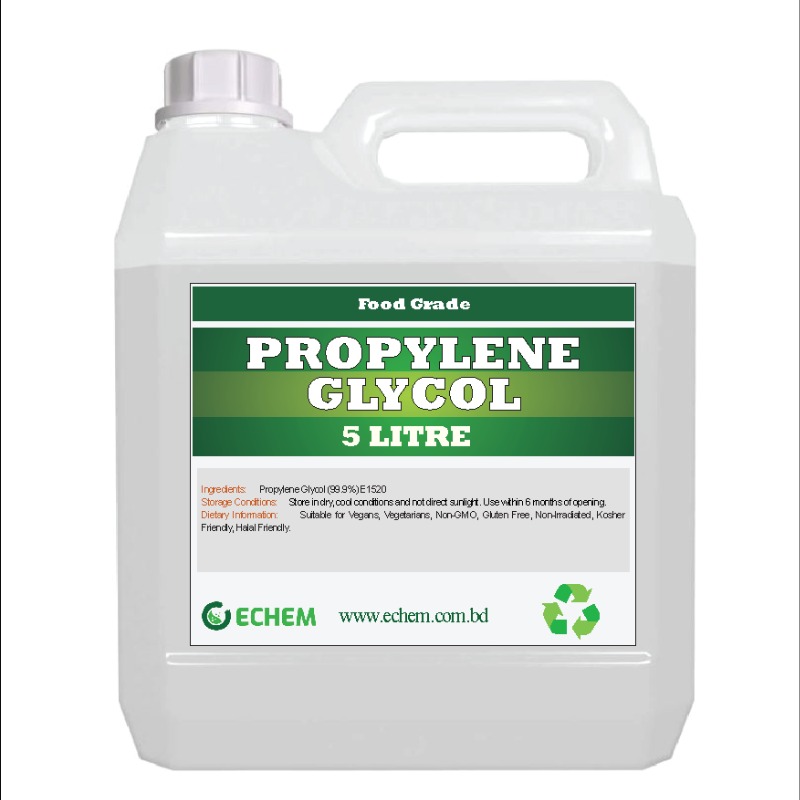
Price :
৳2250
৳2800
Estimated Shipping Time: Order to Shipment Time: 3 to 5 days
Product SKU: 9lP4547Nye
Propylene Glycol কী?
Propylene Glycol হল একটি রাসায়নিক যৌগ, যা সাধারণত তরল অবস্থায় থাকে। প্রোপিলিন গ্লাইকলের রাসায়নিক সংকেত হল C3H8O2। Propylene Glycol এর একটি প্রধান বৈশিষ্ট্য হল, এটি একটি রঙ বিহীন, স্বাদহীন তরল পদার্থ যার ফলে এটি খুব সহজেই খাদ্য, চিকিৎসা ও প্রসাধনী শিল্পে ব্যপকহারে ব্যবহার করা যায়।
প্রোপিলিন গ্লাইকল কিছু উল্লেখযোগ্য ব্যবহার হলঃ
1. এন্টিফ্রিজিং এজেন্ট: প্রোপিলিন গ্লাইকল এন্টিফ্রিজিং এজেন্ট হিসেবে তাপমাত্রা নিয়ন্ত্রণ করে এবং উষ্মতা ও শীতলতার মাঝে একটি সাম্যাবস্থা তৈরী করে, যাকে মুলত এইচভিএসি সিস্টেম বলা হয়ে থাকে।
2. চিকিৎসা ক্ষেত্রে: প্রোপিলিন গ্লাইকল চিকিৎসা ক্ষেত্রে ব্যপকহারে ব্যবহৃত হয়, এর দ্বারা বিভিন্ন প্রকার ক্রিম, ওয়াশিং এজেন্ট এবং অন্যান্য নিত্যপ্রয়োজনীয় চিকিৎসা পণ্য তৈরী করা হয়।
3. খাবার উৎপাদন: এটি খাবারের উৎপাদনে ব্যবহৃত হয়, প্রোপিলিন গ্লাইকল খাদ্য উপাদানে অ্যান্টিফ্রজিং এজেন্ট হিসেবে কাজ করে খাদ্য তরলের উষ্মতা এবং শীতলতার মাঝে একটি স্থিতিশীলতা বজায় রাখে।
4. প্রকৌশল এবং শিল্প রসায়ন: প্রোপিলিন গ্লাইকল বিভিন্ন প্রকার শিল্প উৎপাদনে সক্রিয় উপাদান হিসেবে ব্যবহৃত হয় ।যেমনঃ রং তৈরি, কোটিং ইত্যাদি।
5. ফার্মাসিউটিক্যাল: বিভিন্ন প্রকার ওষুধী পণ্যের কার্যকরীতা বজায় রাখতে প্রোপিলিন গ্লাইকল ব্যবহৃত হয় ।
6. Deicing এজেন্ট বা বরফ প্রতিরোধকঃ প্রোপিলিন গ্লাইকল Deicing এজেন্ট হিসেবে কাজ করে, এটি খুব সহজে বরফের গলনাংক কমিয়ে বরফকে গলতে সাহায্য করে, যার ফলে প্রোপিলিন গ্লাইকলের দ্বারা শীতপ্রধান দেশের রাস্তা, রানওয়ে ইত্যাদি যান চলাচল স্থানে জমে থাকা স্নো কিংবা বরফ খুব সহজে অপসারণ করা যায়।
7. কসমেটিকস: প্রোপিলিন গ্লাইকল প্রসাধনী শিল্পের বেশিরভাগ তরল পণ্যে যেমন লোশন, ক্রিম, এবং তেল ইত্যাদির উৎপাদনে ব্যবহার করা হয়।
8. খাদ্য সংরক্ষক: প্রোপিলিন গ্লাইকল খাদ্য উপাদানে ব্যবহার করা হলে এটি খাদ্য উপাদনে ব্যাকটেরিয়া এবং বিভিন্ন ক্ষতিকর জীবাণুর সংক্রমণে বাধা প্রদান করে যার ফলে খাদ্য সংরক্ষণে এটি একটি কার্যকরী উপাদান হিসেবে ব্যবহৃত হয়।
Propylene glycol is a chemical compound commonly used for various purposes in industry, medicine, and food production. Here's a description of propylene glycol in 10 key points:
Chemical Structure: Propylene glycol is a synthetic organic compound with the chemical formula C3H8O2. It is a type of alcohol known as a diol or glycol.
Clear Liquid: It is a colorless, odorless, and tasteless liquid with a slightly sweet taste.
Solvent and Carrier: Propylene glycol is valued for its ability to dissolve many substances, making it a versatile solvent and carrier in various applications.
Antifreeze: One of its most common uses is as an antifreeze agent in automotive cooling systems and in HVAC systems to prevent freezing and corrosion.
Humectant: It has hygroscopic properties, meaning it attracts and retains moisture. This makes it a common ingredient in cosmetics, skincare products, and food items to help maintain moisture content.
Preservative: Propylene glycol can act as a preservative by inhibiting the growth of bacteria and fungi, extending the shelf life of products.
Food Additive: It is classified as generally recognized as safe (GRAS) by the U.S. Food and Drug Administration (FDA) and is commonly used as a food additive, particularly in processed foods, beverages, and baked goods.
Pharmaceuticals: It is utilized in pharmaceutical formulations as a solvent for oral, injectable, and topical medications, and as a carrier for active ingredients in creams, ointments, and lotions.
Personal Care Products: Propylene glycol is found in a wide range of personal care products such as shampoos, soaps, toothpaste, and deodorants due to its moisturizing and emulsifying properties.
Industrial Applications: Beyond consumer products, propylene glycol is used in industrial processes including hydraulic fluids, paints and coatings, deicing solutions, and as a component in the production of polyester resins.
Here's a summary of the key features of propylene glycol:
Versatile Solvent: Propylene glycol serves as a highly effective solvent, capable of dissolving a wide range of substances. This property makes it valuable in various industries, including pharmaceuticals, cosmetics, food, and industrial applications.
Humectant: As a humectant, propylene glycol attracts and retains moisture, helping to maintain the hydration levels of products and substances it's added to. This feature is particularly beneficial in skincare products, cosmetics, and food items.
Antifreeze Properties: One of its primary applications is as an antifreeze agent, where it prevents freezing and corrosion in automotive cooling systems and HVAC systems. This property is crucial for maintaining the functionality and longevity of equipment in cold environments.
Preservative: Propylene glycol exhibits preservative properties by inhibiting the growth of bacteria and fungi. This characteristic extends the shelf life of products, making it a valuable additive in pharmaceuticals, cosmetics, and food items.
Stability: It is known for its chemical stability, which ensures that products containing propylene glycol maintain their integrity and efficacy over time. This stability is particularly important in formulations where consistent performance is essential.
Safety: Propylene glycol is generally recognized as safe (GRAS) by regulatory bodies such as the U.S. Food and Drug Administration (FDA) when used in accordance with established guidelines. Its safety profile, coupled with its versatile properties, contributes to its widespread use in various consumer and industrial products. However, like any chemical, proper handling and usage are crucial to mitigate potential risks.
No Review Found.
| Quantity | Discount |
|---|---|
| 10+ | 1% Off |
echem
473
Total Item
Login To Comment